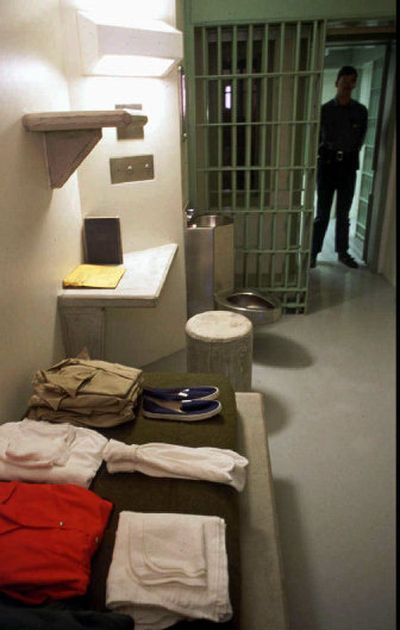‘The Tombs’ secure to max

WASHINGTON – It’s not the death penalty, but convicted al-Qaida conspirator Zacarias Moussaoui will soon face a punishment that some consider even worse: up to 23 hours a day in a soundproof, concrete cell, cut off from contact with anyone other than his guards and, perhaps, the lawyers who helped save him from execution.
Moussaoui is expected to be transferred within days to the Administrative Maximum United States Penitentiary, or Admax, in Florence, Colo., the federal government’s most secure prison, located in the high desert 90 miles south of Denver.
Dubbed the “Alcatraz of the Rockies” by prison experts – and “The Tombs” by many prisoners and their lawyers – the 12-year-old “supermax” facility houses about 400 of the most dangerous and infamous prisoners in the federal system, from “Unabomber” Theodore J. Kaczynski to Ramzi Yousef, architect of the 1993 World Trade center bombing. After the Sept. 11, 2001, attacks, the U.S. Bureau of Prisons transferred most, if not all, terrorism-related inmates there.
But Moussaoui is unlikely to meet, or even glimpse, Yousef or any other fellow jihadists at the Florence facility anytime soon, according to those familiar with operations there.
In the most tightly monitored part of the facility, known as the “control unit,” inmates are kept in segregation at all times – living, sleeping and eating in individual cells poured from concrete that measure approximately 7 feet by 11 feet. They are designed to ensure that inmates cannot speak to or make eye contact with each other, according to defense lawyers, human rights advocates and others who have had access to the facility.
Most of the facility’s cells are outfitted with small black-and-white televisions with a limited number of channels. It is unclear whether Moussaoui will be allowed to watch one.
Some inmates are allowed a handful of visitors and phone calls each month, but many of those incarcerated for terrorism-related crimes have no visitors other than their attorneys and the guards who shackle them whenever they are moved, according to defense attorneys and court testimony.
The prison includes several general population units where inmates are given much greater freedom, including communal dining, as part of a program to move former troublemakers back into regular penitentiaries. But many defense attorneys for inmates convicted on terrorism charges say the harshest restrictions have not been lifted for their clients, who are often subject to special administrative measures, or SAMs, ordered by the attorney general.
Bernard Kleinman, a New York lawyer who represents Yousef, said he is the only person allowed to visit his client. He said Yousef often spends days at a time without leaving his cell, declining an hour of solitary exercise time because of body-cavity searches performed before and after each session.
“Anybody who thinks the death penalty was more punishment than this doesn’t know what it’s like to live completely alone for the rest of your life,” Kleinman said.
Numerous officials said Moussaoui is certain to be sent to Florence. He is likely to be transferred within a few weeks, but for security reasons the move will not be disclosed until after it occurs.